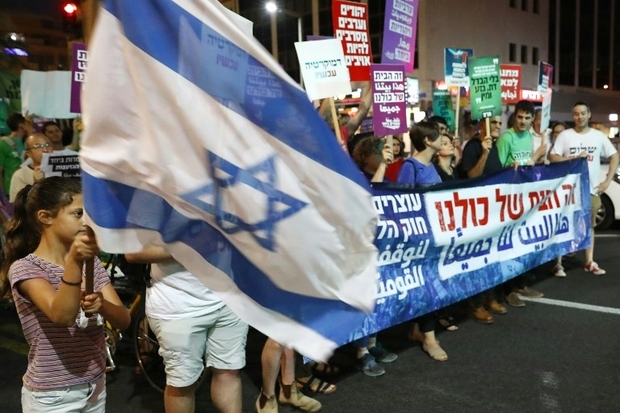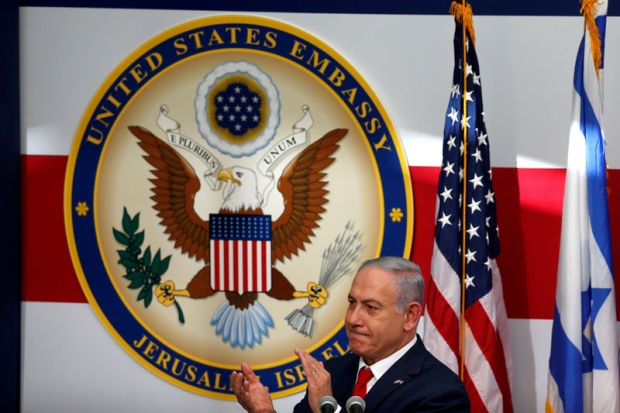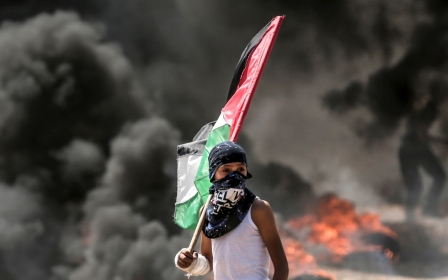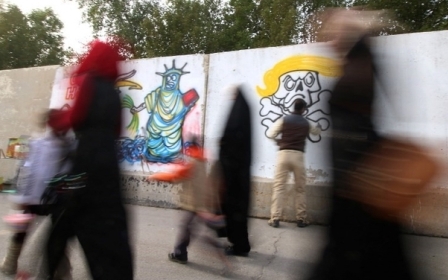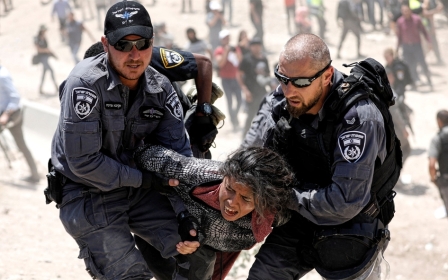The five defining moments of the Israeli occupation in 2018
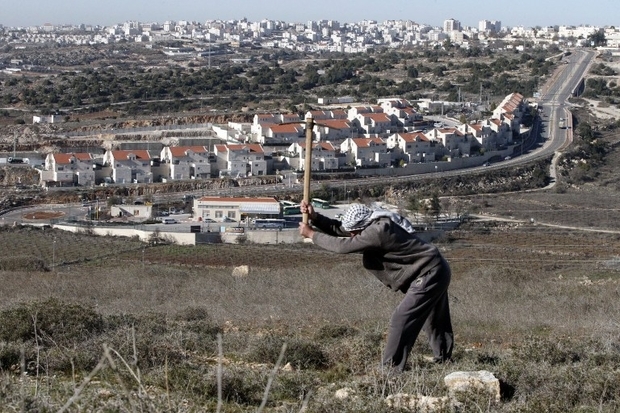
RAMALLAH, occupied West Bank – In the volatile reality of Israel’s ongoing occupation and campaign of ethnic cleansing against Palestinians, the news cycle never stops. The nightly military raids, arrests of young men, killing of civilians and home demolitions have continued – as they have for the past 70 years.
But 2018 also saw substantial political changes that will keep this year etched in the memory of many Palestinians.
Many believe that while Israel has merely continued to enact policies consistent with its Zionist ideology, this year saw such practices become even more flagrant.
“What stood out the most in 2018 is that Israeli policies have become completely overt,” Nisreen Elayyan, a Palestinian lawyer based in Jerusalem, told Middle East Eye. “It no longer tries to disguise its policies and goals, particularly with violating basic human rights.”
Here are the five biggest political events in the occupied Palestinian territory to have taken place this year.
Great March of Return in the Gaza Strip
In the ongoing Palestinian struggle for freedom, the Great March of Return protests in the besieged Gaza Strip have been one of the biggest developments of the year.
On 30 March, thousands of Palestinians in Gaza gathered on the boundary with Israel in a mass demonstration movement known as the Great March of Return.
The demonstrations were organised to coincide with Land Day, which marks the events of 30 March 1976 when Israeli police killed six Palestinian citizens of Israel who were protesting against land theft.
The Great March of Return, which continues until today, has called for the right of return of Palestinian refugees to their homes, from which they were expelled during the Nakba - or catastrophe - amid the establishment of the state of Israel in 1948. The protests also called for an end to the 11-year siege of Gaza and Palestinians’ right to dignity and freedom.
Some two-thirds of Gaza’s two million inhabitants are refugees from towns and cities in present-day Israel such as Jaffa and Asqalan - since renamed Yafo and Ashkelon. The small Palestinian territory is highly impoverished, with more than 80 percent of its population relying on humanitarian aid.
Since the beginning of the protests, Israeli forces have killed at least 230 Palestinians in the besieged coastal enclave - at least 190 of whom were killed during the March of Return demonstrations - and wounded more than 25,000 people.
“In 2018, we saw Israel continue its unlawful killing of demonstrators in Gaza. Officers repeatedly fired on protesters who posed no imminent threat to life, pursuant to expansive open-fire orders from senior officials that contravene international human rights law standards,” Omar Shakir, the Israel and Palestine director for Human Rights Watch, told MEE.
Israel passes Nation-State law
On 19 July, the Israeli parliament, known as the Knesset, passed the nation-state bill into its Basic Law - Israel’s equivalent to a constitution - affirming that the right to national self-determination in the state of Israel was “unique to the Jewish people”, a move decried by rights groups and Palestinians alike as an apartheid policy.
The nation-state law also states that Israel “views the development of Jewish settlement as a national value, and shall act to encourage and promote its establishment and strengthening” - despite settlements being deemed illegal under international law.
For Jamal Zahalqa, a Palestinian-Israeli member of the Knesset, the law’s passing was the most important development of 2018 for Palestinians, especially Palestinian citizens of Israel, who make up some 20 percent of the country’s population.
“What Israel did is transfer the concept of the nation-state law from the state to the cities,” Zahalqa told MEE. “The law indicates that settlements are not a choice for the state, but it is the state’s obligation. Today, the law forces the state to encourage and financially support settlements.”
Zahalqa pointed to the Israeli town of Afula, whose municipality has openly pushed to “preserve the Jewish character” of the city following the passage of the nation-state law, “meaning that they would prevent Palestinians from living there and from entering the public parks there”.
“This law gives legality to the occupation, to the Judaisation of Jerusalem. It opens the door for much more. We must monitor the implementation of this dangerous law in 2019.”
Shakir agreed with the Knesset member: “In 2018, we saw the further entrenchment of the two-tiered discriminatory system that treats Palestinians unequally - not only in the West Bank but also inside Israel proper.
“The nation-state law enshrined as a constitutional mandate Jewish supremacy over non-Jews, which has effectively guided Israeli policy for years.”
Trump moves US embassy to Jerusalem
On 6 December 2017, US President Donald Trump broke with decades of American policy towards the Palestinian-Israeli conflict and recognised Jerusalem as the capital of Israel - announcing that his country would move its embassy from Tel Aviv to the holy city.
On 14 May, which marked the 70th anniversary of the Nakba - and Israel’s Independence Day - the US moved its embassy to Jerusalem, infuriating the diplomatic community and sparking protests in Gaza that were put down violently by Israeli troops, leaving 68 dead.
Due to Jerusalem's importance to followers of the three Abrahamic religions, the city's status has long been the main sticking point in the Israeli-Palestinian conflict.
Israel occupied the eastern half of the city, which houses the Old City and religious landmarks such as the al-Aqsa Mosque compound, the Church of the Holy Sepulchre and the Western Wall, in 1967. It then proceeded to annex Jerusalem in contravention of international law, and in 1980 proclaimed it as its "eternal, undivided capital".
Until Trump’s move, Israel's control and sovereignty over the city had not been recognised by any country in the international community, and all embassies were based in Tel Aviv.
In the wake of the US decision Guatemala and Paraguay also moved their embassies to Jerusalem - although Paraguay later rescinded the move. A number of politicians in other countries have also since called for their states to follow suit.
The Palestinian leadership, which has long called for the establishment of a Palestinian state with East Jerusalem as its capital as part of a two-state solution, saw Trump's declaration and embassy move as a fatal blow to the already stalled peace process.
Elayyan said the transfer of the embassy ”implicitly translated into an encouragement for Israel to continue and intensify its racist policies against Palestinians in the city.
“The state has employed more violence, became bolder and was encouraged to transfer more Israelis into Palestinian neighbourhoods in Jerusalem,” she explained.
In the long term the embassy move, Elayyan said, will have “many adverse political dimensions on the Palestinian people - both inside and outside Palestine”.
She added that the move would make it much more difficult in the future to establish a Palestinian state, especially if other countries followed suit.
Israel attempts to demolish Khan al-Ahmar village
In 2018, the Palestinian Bedouin village of Khan al-Ahmar, east of Jerusalem in the occupied West Bank, came under threat of demolition by Israeli authorities - and saw solidarity pour in from local and international activists and diplomats.
The village, home to some 200 residents and an eco-friendly school that serves children from surrounding communities, stands in the way of Israel’s plans to create a contiguous bloc of illegal settlements in the central West Bank just east of Jerusalem.
Due to Khan al-Ahmar’s strategic location in the last corridor between the occupied West Bank and Jerusalem, Israel’s demolition would mean the division of the West Bank in half - and the final nail in the coffin of the two-state solution.
When Israeli bulldozers have approached the village, activists and residents stood their ground and blocked soldiers from razing the community to the ground; many were beaten and arrested.
Israel’s security cabinet eventually put the demolition on hold, but Prime Minister Benjamin Netanyahu vowed his government would still go ahead with the plans, without saying when the move would take place.
Several European governments and human rights organisations said the demolition of the village would constitute a war crime though the forcible displacement of an occupied civilian population.
“The problem of Khan al-Ahmar is bigger than the village itself. It is about the establishment of a Palestinian state. The so-called peace efforts depend on this village. If this village is demolished, then the Palestinian dream crumbles,” Eid Khamis, the community spokesperson and leader, wrote for MEE earlier this year.
It remains unclear whether the demolition will take place in 2019, but activists have kept a close eye on the situation, monitoring any developments.
Rights groups have warned that if Israel succeeds in destroying Khan al-Ahmar, at least 8,000 other Palestinians in similar communities may face the same fate.
Airbnb announces it will remove listings from Israeli settlements
In November, the global online rental marketplace Airbnb announced it would begin a process to remove listings from illegal Israeli settlements in the occupied West Bank.
"We concluded that we should remove listings in Israeli settlements in the West Bank that are at the core of the dispute between Israelis and Palestinians," Airbnb said in a statement.
"US law permits companies like Airbnb to engage in business in these territories. At the same time, many in the global community have stated that companies should not do business here because they believe companies should not profit on lands where people have been displaced," the statement read.
"We know that people will disagree with this decision and appreciate their perspective. This is a controversial issue."
Airbnb has since been pressured by Israel to rescind its decision.
Human rights groups have long shamed Airbnb and other companies for doing business in the occupied Palestinian territories, exposing how it contributes to a two-tiered system of discrimination.
“Airbnb took the only course of action that it could to comply with its responsibilities under the UN guiding principles on business and human rights - not to directly facilitate and profit from rights abuse,” said Shakir of Human Rights Watch.
“I think it's an important message - not only to other businesses that continue to do business in and with settlements, but also to the Israeli government - that the international community will not be a party to the abuses associated with its ongoing ugly occupation of the West Bank.”
Middle East Eye delivers independent and unrivalled coverage and analysis of the Middle East, North Africa and beyond. To learn more about republishing this content and the associated fees, please fill out this form. More about MEE can be found here.



